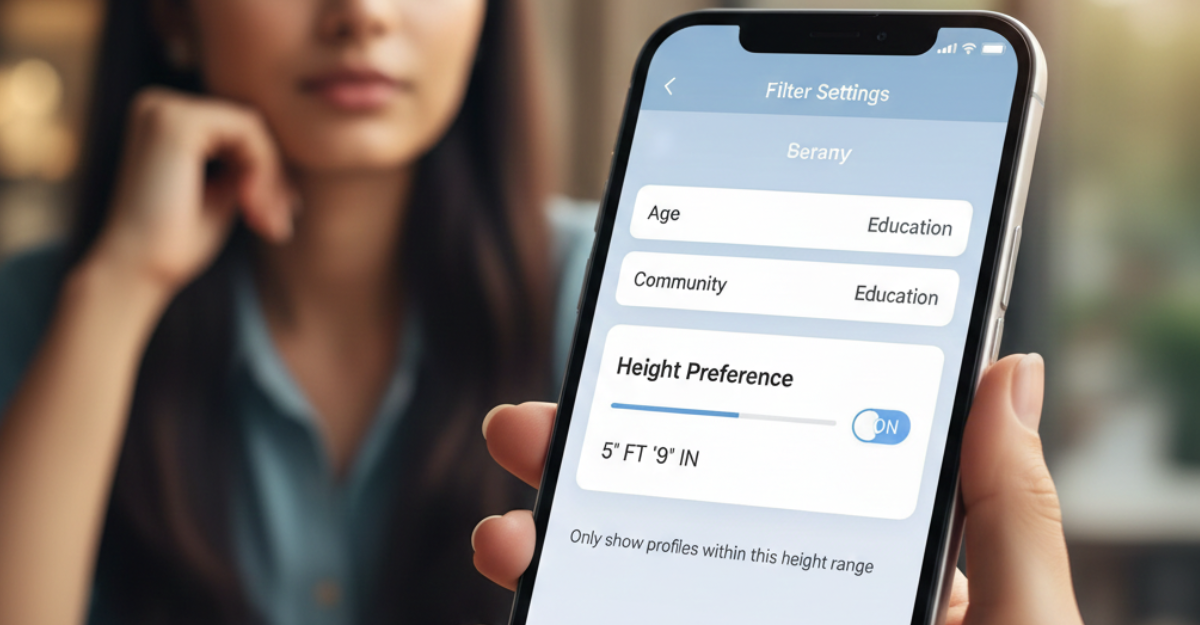
One night in Bengaluru, 28-year-old PR executive Arshia Gulrays was out with friends when a potential match approached her. He was charming, well-spoken, but under 5’10, she says. Within minutes, he made a request she’d heard before: “Could you wear flats when we meet next time?” “There was no next time,” she says. “That comment alone was enough.”
In India’s urban dating culture, where apps promise limitless choice and first impressions are ruthless, height has quietly become one of the most decisive filters. While women often speak openly about beauty standards, the discomfort around male height insecurity is rarely voiced. Yet across heterosexual and queer dating spaces, height has emerged as a currency, one that short men are continually penalised for.
Tall men have long been framed as desirable, dominant, and dependable. From Bollywood romances to matrimonial ads, height isn’t just a physical attribute; it’s a shorthand for masculinity and status.
“Tall height is attractive largely due to social conditioning, not emotional compatibility,” says Dr Rimpa Sarkar, Clinical Psychologist and Founder of Sentier Wellness in Mumbai. “Media and matrimonial culture repeatedly pair a tall man with a shorter woman. Height becomes symbolic of confidence, status, protection, even when these assumptions have no basis in real relationships.”
Dr Shaunak Ajinkya, Consultant, Psychiatrist, Kokilaben Dhirubhai Ambani Hospital, Mumbai,
calls height “A subconscious evolutionary cue” layered with modern patriarchy. “Evolution marked tallness as a sign of protection. Culture converted that into a sign of dominance. Today, dating apps have magnified it. A man never even gets to show his personality if he doesn’t meet a height filter,” he added.
The result, he adds, is a ‘height premium’: taller men receive more attention, more matches, and, in some studies, even higher earnings. Shorter men often face the opposite: less visibility, fewer chances, and more stereotypes.
Don't miss: This Is Why It Is Good To Be A Short Girl

For many women, height preferences feel instinctive. “I only date men who are six feet or above,” says Arshia, who is 5’6. “I like feeling small, protected, and taken care of. I don’t disrespect short men, but they’re not my type.”
Others say the preference emerged not from vanity but from experience.
Disha S, 24, a Senior Associate in Delhi, initially had no height preferences. That changed after she dated shorter men who constantly joked about her 5’11 frame. “They made me height-conscious,” she says. “I liked myself. They didn’t like themselves, and that insecurity got projected onto me.” Now she only dates taller men because it’s emotionally easier, not because taller is better.
For some, height preferences are even more striking. In Chennai, Lubna Ifrah, 25, says, “I’m 4’4, but I only like men taller than 5’10. It’s just my type. The one time I talked to someone who was 5’1, it ended quickly.”
These women aren’t outliers. On Indian dating apps, ‘minimum height’ filters are among the most frequently used by women, especially in metro cities.

For shorter men, the cost of heightism often unfolds quietly. Short men “internalise rejection early,” says Dr Sarkar. “Many start expecting rejection before it even happens.”
This can manifest as avoiding dating, self-deprecating jokes, overcompensation through career, fitness, or humour, difficulty trusting partners and anxious attachment patterns.
Height, being unchangeable, becomes a lifelong wound. “Heightism affects body image,” says Dr Ajinkya. “Shorter men feel the need to overperform in everything else. They carry themselves as if apologising for taking up space,” she added.
The mental health effect can be severe: anxiety, shame, depressive symptoms, loneliness, and in extreme cases, suicidal ideation.
In gay dating spaces, the discrimination is different, but just as sharp.
A 33-year-old queer man from Kolkata describes height as an ‘unspoken hierarchy’: short equals submissive; tall equals dominant. On apps, he says, “men stopped responding the moment I mentioned I’m 5’6.” Yet he notes that straight men have it worse, because many women explicitly rule out shorter partners.
His ex, he recalls, “had such deep height insecurity that he measured himself against my shoulder in public and wore lifted shoes. It affected the relationship far more than the actual height difference.”
Kumar Samal, a 26-year-old professional from Bengaluru, recalls an incident where he arranged to meet someone he matched with on Grindr at a quiet cafe. Kumar reached early, waited, called, waited some more. After 45 minutes, he took the metro home, disappointed but trying to be gracious about it. Only when he was nearing his stop did a message come through. “You looked taller in your pictures. I expected someone 5’9 or above.” The man saw him, judged him, and walked away without a word.
“That one stayed with me,” Kumar says. “I looked at my photos again and again, wondering what I had done wrong, wishing I had been born just a little taller.”
This wasn’t new. Growing up, Kumar was used to nicknames like Chotu, Nata, Geda, teased, dismissed, and lovingly reduced. He learned to smile through them because that’s what boys in India are taught to do: toughen up, laugh it off, never admit the wound.
But the wound was real. As a child, he clung to every remedy—stretching exercises, monkey bars, powders that promised magical growth because height became tangled with worth. Adulthood only raised the stakes. Being ghosted or stood up for something he could never change deepened the self-doubt. “It began affecting how I saw myself. Sometimes I felt like a failure for something that wasn’t even in my control,” he said.
Today, he is learning a gentler language for himself. “This is who I am biologically. I’m done fighting it. I’d rather accept myself fully,” he clarified.
Don't miss: Why Are Only Women Fat Shamed And Not Men?

Heightism doesn’t spare couples who challenge the traditional script either.
In Gurugram, 23-year-old PR professional Sumrudhee has been dating her boyfriend since they were in school. They’re nearly the same height. “People made comments then, and they still do. Even our families sometimes comment. As if love requires a height ratio,” she said.
For her, the expectation that a man must be taller is baffling. “What benefit does society get from a taller man? Why is it an unsaid rule? Compatibility matters, not centimetres.”
Unlike fitness or grooming, height is immutable; yet men are constantly judged for it.
“Because it’s not openly discussed, the shame is silent. People feel they’re overreacting. That isolation harms them most,” says Aanandita Vaghani, mental health counsellor and founder of UnFix Your Feelings, Delhi.
Heightism intersects with body shaming, masculinity norms, and dating app culture. It also thrives in silence: men often feel embarrassed to admit that height affects their self-esteem. “Height is treated as destiny. However, it is not a measure of character or compatibility,” Vaghani says.
Image courtesy: Gemini
For more such stories, stay tuned to HerZindagi.
Our aim is to provide accurate, safe and expert verified information through our articles and social media handles. The remedies, advice and tips mentioned here are for general information only. Please consult your expert before trying any kind of health, beauty, life hacks or astrology related tips. For any feedback or complaint, contact us at compliant_gro@jagrannewmedia.com.